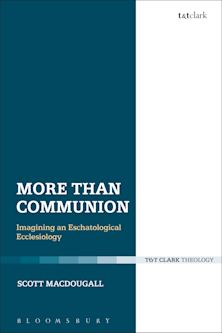Ecumenical and Interreligious Identities in Nigeria
Transformation through Dialogue
Ecumenical and Interreligious Identities in Nigeria
Transformation through Dialogue
This product is usually dispatched within 1 week
- Delivery and returns info
-
Free US delivery on orders $35 or over
You must sign in to add this item to your wishlist. Please sign in or create an account
Description
Dialogue can bring about transformation. That conviction grounds Ikenna Paschal Okpaleke’s argument concerning dialogue between groups and ecumenical and interreligious dialogue in particular. In Ecumenical and Interreligious Identities in Nigeria: Transformation through Dialogue, he examines the fundamental question: What are the additional assets and transformed views which Christian denominations committed to ecumenical dialogue can bring to the table of interreligious dialogue? If Christian dialogue partners, particularly in Nigeria (in this case, Anglicans and Roman Catholics), can change how they perceive one another—moving from antagonism to friendship, division to unity—then they, as ecumenically transformed Christians, can better engage in fruitful and transforming dialogue with the religious other, particularly Muslims. This book addresses (a) the constituents of communal identity and the impact of dialogue on such identity; (b) how the Anglican–Roman Catholic dialogue has (or has not) transformed the communal identities of the dialogue partners, particularly in the local context of Nigeria; (c) the ways in which the perceived advantages of a transformative model of dialogue, shaped by ecumenical encounter and dialogue, can be applied to interreligious encounter and dialogue; and (d) how theological reflection interacts with praxis in promoting transformation through dialogue.
Table of Contents
1. Communal Identity and Dialogue
2. Ecumenical Dialogue and Identity Transformation
3. Transiting from Ecumenical to Interreligious Dialogue
4. Transformation through Dialogue
Conclusion: Theological Proposals and Practices
Product details
| Published | Nov 09 2021 |
|---|---|
| Format | Hardback |
| Edition | 1st |
| Extent | 422 |
| ISBN | 9781978712812 |
| Imprint | Fortress Academic |
| Dimensions | 9 x 6 inches |
| Publisher | Bloomsbury Publishing |
About the contributors
Reviews
-
This innovative study explores new possibilities for religious dialogue in Nigeria. It shows how lessons learned from Christian ecumenical dialogue, especially between Anglicans and Roman Catholics, can give fresh impetus to interfaith dialogue between Christians and Muslims. After the painful history of religious division and violence in Nigeria, a study such as this points to a better way forward. Ikenna Paschal Okpaleke writes with passion and hope. This book will encourage Christians working for peace and reconciliation in many troubled parts of the world.
Nicholas Sagovsky, Canon Theologian Emeritus, Westminster Abbey
-
Ikenna Paschal Okpaleke has produced a work of rigorous research and astonishing depth. In it, he supplies valuable theological resources for the task of critiquing and transforming the divisive beliefs and competitive relationships in the religious–social landscape of Nigeria. Dr. Okpaleke’s breathtaking contextual, constructive, theoretical, and practical interpretation of the Trinitarian identity and relations and his proposal of the insights therefrom for engaging in ecumenical and interreligious encounter in Nigeria are quite distinctive. Believers, their leaders, and scholars in Nigeria and elsewhere will benefit immensely from this book.
Chukwuemeka Atansi, McGill University
-
Fr. Paschal Okpaleke, in this impressive monograph, sets his personal and pastoral experience of the lively and contested world of Nigerian religion within a profound theological reflection on identity, both human and divine. He weaves together the dimensions of the inter-ecclesial and the interreligious and the praxes of dialogue and transformation within a compelling vision that sees Trinitarian faith as a resource in plural contexts, rather than a problem. While he rightly concludes with clearly focused proposals for Nigerian colleagues, there is much in the fine study that will instruct, challenge, and encourage Christians everywhere who are engaged in the dialogical adventure.
Michael Ipgrave, Anglican Bishop of Lichfield
-
In this masterful study, Ikenna Paschal Okpaleke has made a distinguished and original contribution to two important fields: ecumenical and interreligious dialogue. What experiences, skills, and assets do Christian churches actively involved in ecumenical dialogue bring to the table of interreligious dialogue, and how could these assets possibly be enhanced? Okpaleke lucidly and forensically analyses key elements of ecumenical and interreligious issues related to the success or failure of dialogue, taking gentle issue with the view of those who minimize the importance of their interconnectedness. One of the crucial problem areas he identifies is the perception of communal identities and the extent to which they determine religious communities. Most importantly Okpaleke does this not in a merely theoretical way but in the context of the Anglican-Catholic dialogue in Nigeria and the factors that account for the reality and difficulties of interreligious coexistence in that country. In the face of notorious violent incidents this study with its realistic proposals and practices is a ray of hope!
Annemarie C. Mayer, Catholic University of Leuven
-
Most religious and political problems in Nigeria and globally arise because of the failure of interested parties to genuinely and honestly listen to the position of the other and, engaging in a common search, to reach solutions where none is a looser, but where, having become transformed persons through the dialogue, all parties feel inside them that they are winners. Seen in this light, Ikenna Okpaleke’s book, Ecumenical and Interreligious Identities in Nigeria: Transformation through Dialogue, is truly timely. I highly recommend this book to anybody anywhere who genuinely seeks to engage in transformative dialogue.
Teresa Okure, Catholic Institute of West Africa, Port Harcourt
-
Okpaleke offers here persuasive insights to help readers understand the state of ecumenism and interreligious relations in Nigeria. While his work is concerned mainly with a Christian self-understanding and uses the Christian doctrine of the Trinity to illustrate and address the questions of identity-in-difference, people of other religious traditions would also benefit from his extensive and fruitful research.
Journal of Ecumenical Studies

ONLINE RESOURCES
Bloomsbury Collections
This book is available on Bloomsbury Collections where your library has access.


































